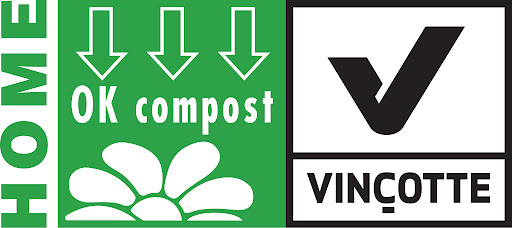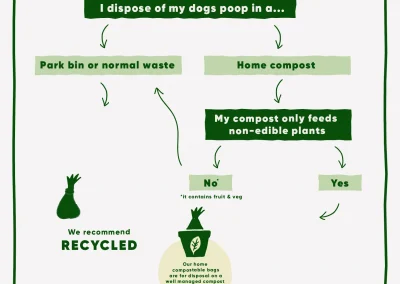Dog Poo Bags: What’s the Scoop?
A warning to you all, we’re about to talk to you all about all dog owner’s least favourite aspect of their dogs….The Poop.
Dog poo is, however much we might wish it otherwise, an unfortunate fact of owning a dog. And with the poop, comes the responsibility of cleaning that poop up.
Now everyone has their own personal preferred method of dealing with their dog’s doo-doo (the long armed stretch, the gag and pick, the stick and flick). But did you know that, in addition to the method of cleaning up your dog’s poo, something you should also now think about is the kind of bag that you use to clean and dispose of your best mate’s poo?
That’s right, dog poo bags are, unfortunately, another environmentally impacting aspect of owning a dog. Scientists have estimated that between 0.76-1.23 million tonnes of dog poo bags are disposed of every year, which accounts for 0.6% of our global waste plastic. This, coupled with the damaging effects that increasing amounts of dog poo has on the natural environment (meaning leaving the poo to decompose in the countryside is no longer considered an environmentally sound option), means that our use of poo bags is, unfortunately, likely to increase over the next few years.
As a result, a number of companies have started producing ‘eco-friendly’ dog poo bags to try and give dog owners peace of mind when it comes to picking up those doodies. However, some of these companies make unrealistic, deliberately misleading claims about what their bags actually do, which can lead to confusion amongst owners as to which kinds of bags are best for them, their dogs, and the environment.
To help you out, below we’ve written about the most common types of ‘eco-friendly’ dog bags, and assess their claims against what they actually do, to give you a chance to decide on what bag works for you. For examples of the kinds of poo bags that we have in stock, pop along to our store!
- Biodegradeable poo bags
The most common type of ‘eco-friendly’ poo bag on the market, producers of biodegradeable poo bags claim that their bags are good for the environment because, unlike traditional plastic bags, they will naturally break down in the environment.
However, dog owners be warned, this isn’t always the case, and a lot of dog poo bag producers make claims about the biodegradeability of their bags which doesn’t actually reflect the real conditions in which people use and dispose of their bags.
Firstly, in order for so-called ‘biodegradeable’ poop bags to naturally break down in the environment they need two specific things: oxygen and high temperatures. Landfill (which is where 95% of dog poo bags in the UK end up going) have neither the oxygen, nor heat levels required to actually meet these conditions, which means that biodegradeable poo bags that go in your bin never actually end up breaking down, and instead contribute to the world’s plastic problem.
So marking something as ‘biodegradeable’ is in fact just a useful marketing ploy for the vast majority of poo bag makers, and is one to avoid if you want to be more planet friendly with your dog’s poop.
2. Certified Home Compostable poo bags
One good alternative to biodegradeable bags are certified home compostable bags. Unlike biodegradeable, bags, certified home compostable bags are designed to break down in home conditions e.g. in your garden compost heap and don’t require unnaturally high levels of oxygen or heat to do so.
You should, however, be careful to ensure that any bag that you are contemplating putting in your home compost is labelled as a certified home compostable bag using this label below.
As with ‘biodegradeable’ bags, some unscrupulous manufacturers will claim that their bag is compostable, when actually what they mean is that they are only compostable in industrial settings (e.g. when subject to extreme levels of heat in a laboratory). So if you don’t see this label on the packet, it is safe to assume that the bag is not actually suitable for home composting conditions and you’ll be left with a stinking pile of s**t next to your peonies.
It’s also worth noting that, as with biodegradeable bags, if you dispose of your compostable poo bag in the regular bin then it will go to landfill where again the conditions will prevent it from breaking down naturally.
In order to successfully compost your dog poo (and bags), you will need to create what is known as a ‘hot’ composter (e.g. a compost heap that produces heat of at least 60C) to make sure that any harmful pathogens in your dog’s poo are broken down and you will also need to mix that poop with sawdust (roughly on a 2:1 poo to sawdust ratio) to give it enough carbon to break down. A guide on composting your dog’s poo at home can be found on Beco’s website here
It generally isn’t advised to spread compost that is made from dog poo on your vegetable patch, as even though composting should break the majority of pathogens down, eating fruits or vegetables that have used dog waste compost still presents a health risk. It’s also worth noting, as our friends at Pet Impact have done, that even though some home compostable bags are advertised as being ‘made from plants’ (and therefore appear to be more eco-friendly) there is no such thing as a 100% plant, or cornstarch based bag on the market still, so when those bags do compost, they will still release micro plastics into the soil.
3. Recycled or ‘Waste Based’ poo bags
If you don’t have a home composter, or if you are disposing of your dog’s poo in a park waste bin, then recycled plastic poo bags are the way to go! Recycled poo bags are bags that are made from plastic that would otherwise have gone to landfill, so they help to remove those plastics from the environment and are a much more sustainable alternative to the home compostable bag if you don’t have access to a garden for composting.
One example of an excellent recycled poo bag that we stock in store at The Dog Grocer is Pet Impact’s Reseacled Poo Bag, which is the world’s first plastic negative poo bag. Reseacled Poo bags are made from 75% recycled waste, meaning that for every bag you use, you are taking more plastic out of the environment than you are putting back in.
Of course, the obvious disadvantage to recycled waste bags is that, unlike the home composter bag, recycled bags won’t break down naturally in the environment, and so can’t be put into your home composter, which means they will still end up in landfill once disposed. However if you are still interested in reusing some elements of your dogs poop, you could consider setting up a dog poo wormery to create compost from your dog’s raw poo, using this guide provided by Pet Impact.
So that’s it from us! If you’re interested in exploring different dog poo bag options then pop into store to see us and to look at the range of home compostable and recycled poo bags that we have in stock. And if you’re still struggling to decide whether recycled or compostable bag is best for you, see this useful flowchart produced by Beco.

